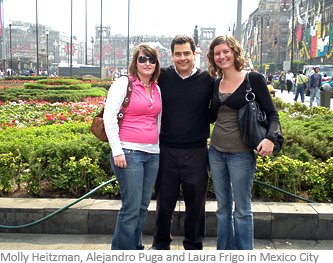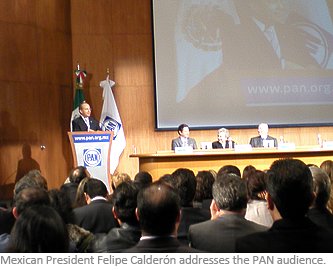News & Media
City of Contrasts
March 19, 2009
Mexico City can be an uncomfortable place to visit. Nearly 22 million people occupy its metropolitan footprint, half a mile above sea level in Mexico's central plateau. Streets are clogged with automobiles that saturate the thin mountain air with exhaust. Poverty-stricken neighborhoods skirt wealthy developments, and businessmen bark orders into cell phones over the promotions of indigenous street peddlers. To outsiders, the city is chaotic—a Philip Glass composition realized in concrete.
But this confusion and disparity has inspired self-taught writers whose works define a Mexico that few tourists know. Incorporating street jargon and performing public readings to make their work accessible, the urban authors of Mexico City have combined literary talent with the authentic experience of city life.
"Many times when we talk about Mexico, our main focus is the border and issues such as immigration," says Alejandro Puga, an assistant professor of modern languages. "I think that urban culture takes a backseat, even though there are so many fascinating things happening in Mexico City in terms of cultural and literary transformations."
Puga frequently returns to Mexico City to record interviews with the local writers. Last year, he was talking about these trips with Molly K. Heitzman '10 when an idea occurred to him. "I was saying how I wish I could bring students with me, but there are so many challenges, such as transportation – it's a very difficult city to get around in without a car – and security.  Molly immediately said that she wanted to go anyway. I thought, well, this might work if students had experience in Latin America – especially in an urban area – and are inherently fascinated with the culture."
Molly immediately said that she wanted to go anyway. I thought, well, this might work if students had experience in Latin America – especially in an urban area – and are inherently fascinated with the culture."
Heitzman had recently spent a semester in Buenos Aires and, as a political science major, was eager to visit the Mexican capital as well. Another student, senior Laura A. Frigo, was also interested in the trip. She'd been to the northern border town of Ciudad Juarez before, but Puga was excited to have her see what he calls the "different planet" of Mexico City.
Frigo and Heitzman traveled with Puga to Mexico City during Winter Term in January 2009. While continuing his research, they discovered people who contradicted the city's rigid social structure.
"Mexico is a Third World country, yet there is an impulse for cultural awareness that refuses to die," Puga explains. "One author grew up at what is considered the poverty level of Mexico City, which is much, much lower than the poverty level in the United States. Against all odds, he published two short story collections, two novels and is now pursuing a graduate degree even though he started out as a construction worker and taxi driver. It's one of many examples that you'll see where people are educating themselves."
"We talked to several people who had received grants to write," Heitzman says. "It surprised me because we don't often hear of this happening in a country like Mexico, much less the United States. Seeing that transformation – somebody able to move up in society by publishing – challenged my idea of what was possible in the city."
Frigo and Heitzman stayed with a Mexican government official who has family connections at DePauw's Center for International and Experiential Education. Even among some of the wealthiest residents of the city, they were never detached from the realities of Mexico's urban life.
"We lived in a big house in what is probably the nicest area of Mexico City, but we would still have power outages," Heitzman says.
"You could see the slums right next to where we were staying," Frigo adds. "You have the really rich areas right next to the poorest areas. That's just the composition of the city.  You're in the center of a city, and you see the Templo Mayor, an Aztec temple. Right next to it is the main plaza, the Zócalo, which is Spanish architecture, and both are surrounded by modern buildings. It's a city of contrasts, and you're constantly bombarded by that."
You're in the center of a city, and you see the Templo Mayor, an Aztec temple. Right next to it is the main plaza, the Zócalo, which is Spanish architecture, and both are surrounded by modern buildings. It's a city of contrasts, and you're constantly bombarded by that."
Their host's political work for the Partido Acción Nacional (PAN) also led to an opportunity to attend a private party rally. They met the former president, Vicente Fox, and listened as President Felipe Calderón gave a speech on PAN's history as Mexico's opposition party.
Having spoken with people from all walks of Mexico City life, Frigo and Heitzman returned to DePauw with an appreciation for the authors who try to capture the city in words. Their presence also helped Puga, who says his own immersion there sometimes gets in the way of the larger picture of his research.
"My professional identity is split in two," Puga says. "I spend all this time researching this gargantuan urban entity, but I'm a professor in a small college in Indiana. I was glad to have students with me because my family lives in Mexico City and I travel there often, so it's not much of a shock to land there. But when I'm walking around in those same streets with students who are seeing them for the first time, I start to see the city as that gargantuan entity again."
Contact Us
Communications & Marketing

Bob Weaver
Senior Director of Communications
- bobweaver@depauw.edu
- (765) 658-4286
-
201 E. Seminary St.
Greencastle, IN 46135